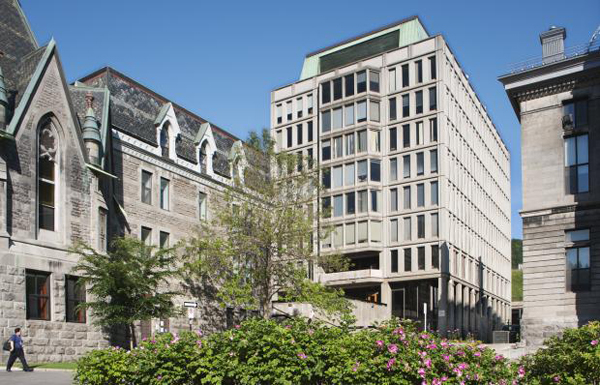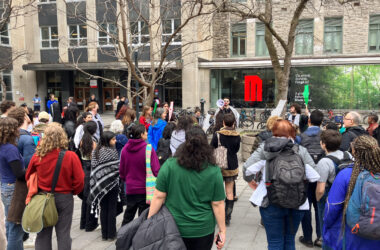On Oct. 25, the Arts Undergraduate Society (AUS) Legislative Council held its fourth meeting of the Fall semester. Councillors passed motions to condemn Bill 62, reduce quorum requirements for General Assemblies (GA), and lower the Ferrier computer lab student fee.
Council condemns Quebec National Assembly Bill 62
Students’ Society of McGill University (SSMU) Arts Representative Jennifer Chan presented a motion to condemn the Quebec provincial legislature for passing the controversial Bill 62, a new law which prohibits citizens from covering their faces while giving or accessing public services, on the basis of religious neutrality. Chan framed the bill as singling out Muslim women, thus going against AUS’ mandate to represent all Arts students equally, and called for the Supreme Court of Canada to rule on its constitutionality.
“[Bill 62] infringes on not just federal guidelines, but also our mandate as AUS,” Chan said. “We condemn it publicly […] and also [ask] for the McGill administration to publicly condemn [it].”
McGill has not condemned the law, but Principal Suzanne Fortier has assured students that McGill’s policies and practices will not be influenced. Chan was not satisfied, and pointed to the importance of actively recognizing McGill’s core values.
“[We must] ensure that students from diverse cultures, ethnic origins, sexual and gender identifications, religious or faith backgrounds, and all types of disabilities receive equitable treatment in the provision of, and access to, [AUS’] services,” Chan said.
Chan’s motion passed unanimously with one abstention.
General Assembly quorum lowered
AUS Vice-President (VP) Academic Madison Wilson and President Erik Partridge moved a motion to reduce the AUS General Assembly (GA) quorum, lowering the minimum number of students needed to hold a GA from 150 to 75 because of traditionally-low voter turnouts.
Additionally, Arts Senator Isabella Anderson called for reducing the current quorum to pass resolutions on AUS strikes and boycotts from 500 to 250.
“If there is something as serious as an AUS strike or boycott, [students] will show up,” Anderson said. “They show up to the GA at SSMU when they care about the issues.”
World Islamic and Middle Eastern Studies Student Association (WIMESSA) VP External Andrew Sandock argued that 250 was an unreasonably high number given that the power to call general strikes and boycotts are vital tools for minority voices, which wouldn’t have popular support or mobilization.
“There are a lot of smaller boycott and strike movements that exist that will never be able to get a quorum of 250 people,” Sandock said. “We’re talking about everything from Free Tibet movements, to Burma, to police brutality, to environmental change. It’s very difficult to rally when you have such a small movement.”
The motion, as well as its amendment for a quorum of 250 for strike and boycott resolutions, passed.
AUS Proposes Arts Computer Lab Fund Fee Referendum
AUS President Erik Partridge proposed including a question in the AUS Fall Referendum to reduce the opt-outable Arts Computer Lab Fund Fee from $7.85 to $3.85. AUS runs a few dozen computers across campus but, according to Partridge, their usage has declined since 2011. Students use, on average, 12 per cent of all arts computers during business hours.
Partridge expressed his desire to reduce the number of computers by 60 per cent and open up the space for group study areas. As an alternative to the desktops, he encouraged students to use the AUS laptop-lending program. Although the usage of this program has increased twofold yearly since its introduction, there are only 40 computers available for rental.
Students will also be voting on a proposed $3 increase on the AUS base fee, from $13.50 to $16.50, to keep up with inflation, as the fee last increased in 2013. Both proposals will go to referendum.
AUS Council will next meet on Nov. 8 at 6 p.m. in Leacock 232.









